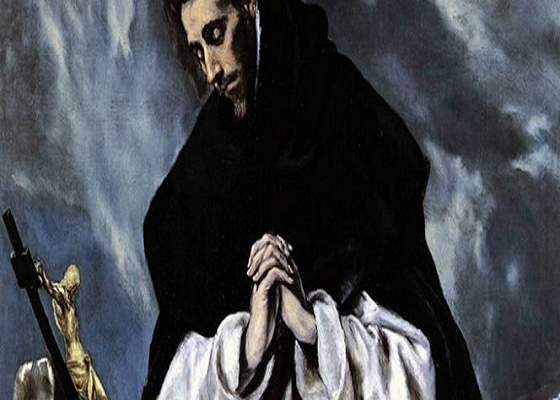
St Dominic
1.4k
 This year, the 800th of the Dominican Order, our governing body, the General Chapter, met in Bologna to discuss and plan the future of Dominicans throughout the world. As you might expect this involves hours and hours of talking and debate and so it must have come as some relief to the brethren when they were given a few hours respite from discussion in order to listen to a Jesuit named after a Franciscan tell them about that first Dominican, St Dominic.
This year, the 800th of the Dominican Order, our governing body, the General Chapter, met in Bologna to discuss and plan the future of Dominicans throughout the world. As you might expect this involves hours and hours of talking and debate and so it must have come as some relief to the brethren when they were given a few hours respite from discussion in order to listen to a Jesuit named after a Franciscan tell them about that first Dominican, St Dominic. The Pope proposed that Dominic’s Order was, and is, built upon three pillars: Preaching, Witness and Charity. It is surely no accident that these three acts correspond to the three theological virtues of Faith, Hope and Charity. Preaching is the sharing of Faith, Witness is living in the Hope of Christ’s Kingdom and Charity is, of course Charity. It’s worth keeping in mind that Charity is the English translation of the Latin Caritas meaning Love. Charity isn’t a particular kind of loving action to do with giving to people in need, though it has since come to mean that in English, but rather it is Love itself. We might very well think that this somewhat undermines the rhetoric: we had Preaching and Faith, Witness and Hope but by the time the Pope got to the third Theological Virtue did he just give up trying to find some corresponding attribute to manifest it? Not likely! Indeed, this tells us more about Love than it does the rhetorical skill of the preacher. In his first epistle to the Corinthians St Paul explains that Faith and Hope will eventually pass away; in Heaven we will see God face to face and so we will need neither Faith nor Hope but what will remain is Love. Love then seems to have a more permanent character, not easily exchanged for something else. We can understand why this should be so when we read St John saying that God is Love for here we find that Love is at the core of Being. Love is like what Plato called the Really Real.
We might say, speaking loosely, that Faith and Hope are more totally ours, though given graciously by God, in that they are acts only possible for transient beings like us who do not possess the Beatific vision and so that’s why we can represent them with the various activities of our life. Love, however, does not belong to us. On the contrary it is by Love that we become the representations, the representations of God in the world.
St Paul speaks of our Faith and Hope as seeing through a glass darkly but we could extend the metaphor and say that the possession of Love transforms us into a murky looking-glass in which is found the reflection of God.
Was St Dominic such a mirror? Of course! And the Pope chose to concentrate on two aspects of the Holy Founder to show this. He recounted the famous story of Dominic selling his books in order to feed the poor and thus reminds us of Dominic’s uncompromising love for his neighbour. But all the more crucially Pope Francis described Dominic as ‘Evangelized by God, to evangelize.’ Dominic’s love for his neighbour was fuelled by, and stemmed from, his love for God. ‘Without strong personal union with Him, the preaching might be very perfect, very reasoned, even admirable, but it will not touch the heart, which is what must change.’
In St Dominic we can find a litany of good deeds to inspire us, but, as Pope Francis has pointed out, good works alone are not enough. What is required is that living-union with God we call the virtue of Charity.
Of course this Charity is watered and fed through the life of prayer, which we should all commit ourselves to (and Dominic was certainly a good example of a man of prayer) but we should not mistake disciplined mediation or personal austerity for Love either. Love is Love. If in moments of reflection we find ourselves unsure about how much Love we really manifest in our lives this shouldn’t surprise us; it is after all the question which sits at the core of human existence and the meaning of life. Thank God then we have Faith and Hope. We can believe in God and trust that he will give to us whatever is lacking that we might continue to serve him in this life and be happy with him forever in the next alongside St Dominic and all the saints.
Sorry, the comment form is closed at this time.



A Website Visitor
Happy feast day!